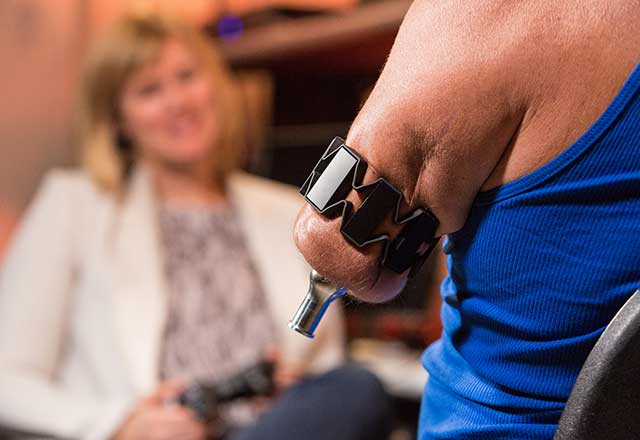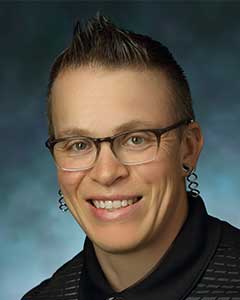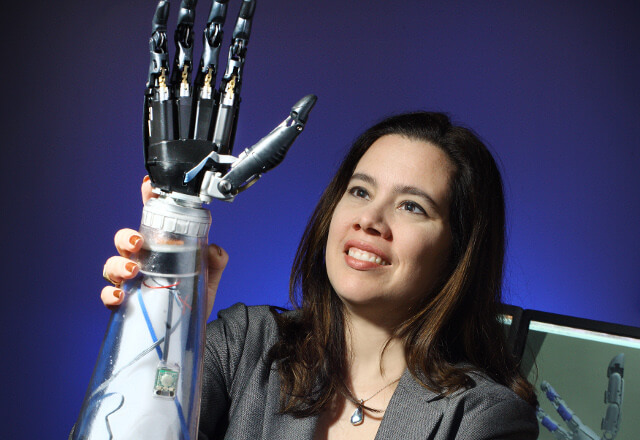-
Barbara Jane De Lateur, M.D.

Expertise: Deconditioning, Gait Analysis, Gait Impairment, Musculoskeletal Disorders, Neuromuscular Disease
-
Marlis Gonzalez-Fernandez, M.D., Ph.D.

Expertise: Amputee Rehabilitation, Botulinum Toxin Injections, Dysphagia, Dysphagia Evaluation, Neuro Rehabilitation
Selecting, applying and getting used to wearing a prosthetic or orthotic device takes time and patience. Our team includes rehabilitation physicians, physical and occupational therapists, orthotists, prosthetists, nurses and rehabilitation psychologists who work closely with you every step of the way, helping ease your pain and improve function.
On This Page:
Schedule An Appointment
Patient Resource Center
The Patient Resource Center provides assistance between appointments with your physician. For assistance between therapy appointments, please contact the clinic location.
Phone: 410-614-4030 and select option 2 | Fax: 410-614-4033
Schedule by phone
Physician appointments: 443-997-5476
Therapy appointments:
Maryland clinics except Bayview: 443-997-5476
Johns Hopkins Bayview: 410-550-0414
Sibley Memorial Hospital: 202-364-7665
Schedule online through MyChart
Prosthetics and Orthotics: Why Choose Johns Hopkins
Multi-Specialty Team
Each member of our team plays an important role in helping you get the training and develop the confidence you need to live your life to the fullest with an orthotic or prosthetic device.
Broad Expertise
We help people with limb loss, amputations, spinal cord injury, stroke, multiple sclerosis, sports-related or traumatic injury, diabetic foot problems and similar conditions through modern orthotic and prosthetic devices and custom care plans.
Specialized Care
Our team is experienced in helping people with upper and lower limb amputations, including those undergoing targeted muscle reinnervation (TMR) and osseointegration to operate a motorized prosthetic.
Advanced Technology
Ease back into your routine by safely practicing walking and other activities in our advanced gym spaces or a custom-built courtyard at The Johns Hopkins Hospital.
Our Approach to Limb Loss Rehabilitation
Our specialists are here to provide expert care during your rehabilitation and prescribe a treatment plan catered to your needs. You can learn more about our process below.
-
Your rehabilitation physician will start with a comprehensive evaluation. It includes assessing your everyday function, wounds, pain management needs, mental health and other factors. Based on this evaluation, we will develop a tailored treatment plan and coordinate care with other specialists.
-
You will probably have several questions about your new device and the logistics of living with it. We take the time to talk to you about what to expect in terms of pain management, recovery and function. Our rehabilitation psychologists are also available to help you prepare mentally and emotionally for changes in your lifestyle.
-
Our physicians will collaborate with devices specialists to understand your needs and help prescribe the most appropriate prosthetic or orthotic device. We frequently work with patients who require specialized or high-tech devices for a specific activity, such as running. Beyond the initial fitting, we can also help you with future repairs, replacement and upgrades.
-
Our physical therapists can help you:
- prepare for leg and foot amputations or application of an orthotic device
- maintain and increase strength, flexibility, coordination and endurance
- transition to wearing a prosthetic or orthotic device with confidence and comfort
- learn how to use a leg or foot prosthesis for walking
- practice independent living skills
-
Among our occupational therapists, we have specialists in hand therapy who can help you:
- prepare for arm and hand amputations or application of an orthotic device
- develop skills to perform daily activities after the amputation with confidence and comfort, and avoid complications
- learn how to use your prosthesis or orthotic in self-care, work and leisure
- train in one-handed skills
-
 Our rehabilitation team includes orthopaedic and plastic surgery experts who can provide the most advanced procedures such as targeted muscle reinnervation (TMR), regenerative peripheral nerve interface (RPNI) or osseointegration.
Our rehabilitation team includes orthopaedic and plastic surgery experts who can provide the most advanced procedures such as targeted muscle reinnervation (TMR), regenerative peripheral nerve interface (RPNI) or osseointegration.
I like to think that I didn't have the foot amputated; I had it replaced. When thinking of it that way, I understand that I was not "losing" a foot, I was simply getting a much better and healthier one.
a Johns Hopkins patient
Our Rehabilitation Team
Limb Loss Care Physicians
Orthosis and Limb Loss Therapists
Makenzie Belak | Physical Therapist
Certifications: Board-Certified Orthopedic Physical Therapist
Expertise: amputee and prosthetics training, orthopedics, pelvic health
Location: Baltimore

Princess Filippi | Occupational Therapist, Clinical Specialist
Certifications: Board-Certified Hand Therapist
Expertise: amputee and prosthetics training, hand therapy, orthopedics - upper extremity, orthotic fabrication
Location: Baltimore

Keelin Godsey | Physical Therapist, Clinical Specialist
Certifications: Board-Certified Orthopedic Physical Therapist, Board-Certified Sports Physical Therapist, Certified Strength and Conditioning Specialist, Fellow of the American Academy of Orthopedic Manual Physical Therapists
Expertise: amputee and prosthetics training, orthopedics, sports rehabilitation
Location: Lutherville

Mark Hopkins | Physical Therapist and Prosthetist/Orthotist
Certification: Board-Certified Hand TherapistExpertise: amputee and prosthetics training, orthotic fabrication, prosthetic fabricationLocation: Baltimore

Kathleen Jefferies | Occupational Therapist
Expertise: hand therapy, lymphedema, orthopedics - upper extremity, orthosis fabrication
Locations: Lutherville and White Marsh

Phyllis Kramer | Occupational Therapist
Certifications: Board-Certified Hand Therapist
Expertise: hand therapy, orthopedics - upper extremity, orthotic fabrication
Location: Odenton

Dawn Kutcher | Occupational Therapist
Certifications: Board-Certified Hand Therapist, Certified Lymphedema Therapist
Expertise: breast cancer, hand therapy, lymphedema, orthopedics - upper extremity, orthotic fabrication
Location: White Marsh

Ed Lyons | Physical Therapist
Expertise: amputee and prosthetics training, neurologic rehabilitation, oncology, orthopedics
Location: Baltimore

Jennifer Nicholas | Occupational Therapist, Rehab Therapy Manager
Certifications: Board-Certified Hand Therapist, Certified Lymphedema Therapist
Expertise: breast cancer, hand therapy, lymphedema, oncology, orthopedics - upper extremity, orthotic fabrication
Location: Lutherville

Kaitlin O'Sullivan | Occupational Therapist
Certifications: Board-Certified Hand Therapist
Expertise: hand therapy, neurologic rehabilitation, orthopedics - upper extremity, orthotic fabrication
Location: Baltimore

Joseph Reagan | Occupational Therapist
Certifications: Board-Certified Hand Therapist
Expertise: hand therapy, orthopedics - upper extremity, orthotic fabrication
Location: Timonium

Elise Rochford | Occupational Therapist
Expertise: hand therapy, orthopedics - upper extremity, orthosis fabrication
Location: Columbia

Maria Rothenheber | Occupational Therapist
Expertise: hand therapy, orthopedics - upper extremity, orthotic fabrication
Location: Baltimore

Megan Shawl | Physical Therapist, Team Coordinator
Certifications: Board-Certified Orthopedic Physical Therapist
Expertise: amputee and prosthetics training, orthopedics, orthotic fabrication, running analysis
Location: Lutherville

Ryerson Stinson | Occupational Therapist
Certifications: Board-Certified Hand Therapist, Titleist Performance Institute Medical 2 Certified
Expertise: hand therapy, orthopedics - upper extremity, orthotic fabrication, sports rehabilitation
Location: Columbia




